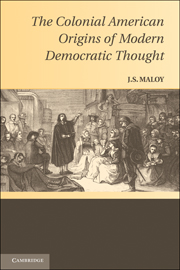Book contents
- Frontmatter
- Contents
- Preface
- 1 Introduction: Accountability and Democratic Theory
- 2 Radical Trust and Accountability in the Seventeenth Century
- 3 Fidelity and Accountability in Virginia and Bermuda
- 4 Politics and Ecclesiastics in Plymouth and Massachusetts
- 5 Constitutional Conflict and Political Argument at Boston
- 6 Democratic Constitutionalism in Connecticut and Rhode Island
- 7 Conclusion: Anglophone Radicalism and Popular Control
- Bibliography
- Index
5 - Constitutional Conflict and Political Argument at Boston
Published online by Cambridge University Press: 03 December 2009
- Frontmatter
- Contents
- Preface
- 1 Introduction: Accountability and Democratic Theory
- 2 Radical Trust and Accountability in the Seventeenth Century
- 3 Fidelity and Accountability in Virginia and Bermuda
- 4 Politics and Ecclesiastics in Plymouth and Massachusetts
- 5 Constitutional Conflict and Political Argument at Boston
- 6 Democratic Constitutionalism in Connecticut and Rhode Island
- 7 Conclusion: Anglophone Radicalism and Popular Control
- Bibliography
- Index
Summary
It is particularly essential that [the United States House of Representatives] should have an immediate dependence on and an intimate sympathy with the people. Frequent elections are unquestionably the only policy by which this dependence and sympathy can be effectually secured.
The Federalist, no. 52, 1788 (Hamilton et al. 2005, 286)Against the conventional wisdom derived from studies of the revolutionary period, Riley long ago showed that bicameralism in America originated not in imitation of the British parliament but rather, in the seventeenth-century New England context, as the result of developments within the typical structure of the English trading companies under which the colonies were begun (Riley 1896, 161–3). More specifically, the division of legislative power between two chambers arose from the evolving independence of the governor and his assistants as a body from the company courts to which they had been originally attached. This is precisely what happened at Boston after the Massachusetts Bay Company was removed in its entirety from London to New England in 1630. There the advocates of non-electoral procedures of accountability of magistrates to freemen were the same constitutional reformers who resisted this bicameral development, though in the end they accommodated themselves to it. They failed in their quest for unicameralism, which their critics on both sides of the Atlantic derided as “democratic,” but they succeeded at least in articulating and institutionalizing robust means of subjecting governing elites to popular control.
- Type
- Chapter
- Information
- The Colonial American Origins of Modern Democratic Thought , pp. 114 - 139Publisher: Cambridge University PressPrint publication year: 2008



